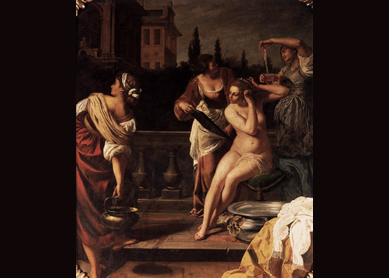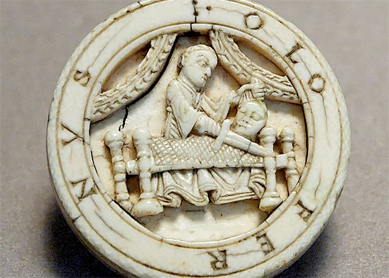The brief account of the first sexual encounter between David and Bathsheba in
Those who see Bathsheba as an equal partner in what transpired contend that she must have known that David could see her bathing from the palace roof, and thus she intentionally provoked him by flaunting her body before him. When David sends for her, she immediately comes to the palace without hesitation, and there is no description of her putting up resistance to his sexual advances. She is quick to tell David of her pregnancy and to marry him as soon as the mourning period for her husband is over. Moreover, since the author relays that both David and Bathsheba suffered from the punishment of the death of their child, they both must be considered guilty of wrongdoing.
Those who see Bathsheba as an innocent victim maintain that she probably assumed that David was at war leading his troops, not in the palace, and certainly not wandering about on the roof. Most likely she was bathing in an inner courtyard, a private space where she thought no one could see her. When summoned by the king, she probably feared that her husband had been killed or wounded in battle, so of course she immediately came to the palace. Once the king’s intent was clear, she was in no position to refuse his sexual advances, given the power imbalance between them. When Bathsheba discovered she was pregnant, she likely panicked. Since Uriah, her husband, was away at war, it would be obvious that the child she was carrying was not his. She could not have known that reaching out to David in desperation would result in the murder of her husband. Bathsheba also did not necessarily want to marry David, but she had no other option. She was pregnant and widowed, so when David sent for her and brought her into his household, she did not resist.
Although the description of the events in
Though the text never tells us exactly what happened between David and Bathsheba on that balmy spring evening, the evidence appears to indicate that it was likely not a mutually consensual liaison. Rather, Bathsheba was an innocent victim who was subjected to an egregious abuse of power and who tried to salvage whatever she could out of a terrible situation.
Bibliography
- Koenig, Sara M. Isn’t This Bathsheba? A Study in Characterization. Eugene, OR: Pickwick Publications, 2011.
- Exum, J. Cheryl. Plotted, Shot, and Painted: Cultural Representations of Biblical Women. Sheffield: Sheffield Phoenix Press, 2012.
- Frymer-Kensky, Tikva. Reading the Women of the Bible: A New Interpretation of Their Stories. New York: Schocken, 2002.





